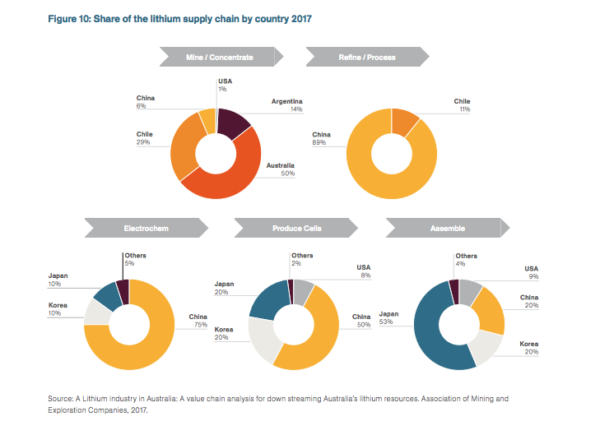Despite its abundant resources and ability to source, refine and produce all key materials in the lithium-ion battery chemistry, Australia has done little to explore the opportunities along the supply chain.
Austrade’s new Lithium-Ion Battery Value Chain: New Economy Opportunities for Australia strategy is looking to change this, pointing to Australia’s potential to host the entire supply chain and become a world powerhouse in lithium-ion battery manufacturing.
“With growing global demand for lithium-ion batteries, this report recognises that Australia has a once-in-a-generation opportunity to transform into a major processing, manufacturing and trading hub for lithium-ion batteries,” Minister for Trade, Tourism and Investment Simon Birmingham said in a statement.
“Australia is uniquely blessed with numerous rare earths, that are increasingly important both economically and strategically across the globe. Our ambition is to drive enhanced investment across the value chain of commodities like lithium.”
Australia is the world’s biggest supplier of lithium. In 2017, it overtook Chile in global lithium production as it reached 18,700 tons and 43.5% global market share, compared to 14,100 tons in Chile that amounted to 32.8% of global supply. Nonetheless, the nation captures only 0.53% of ultimate value of its exported ore.
According to the report, Australia currently produces nine of the ten mineral elements required to produce most lithium-ion battery anodes and cathodes, and has commercial reserves of graphite – the remaining element. In addition, it has secure access to all of the chemicals required for lithium-ion battery production.
Against the backdrop of the global spread of electro-mobility and energy storage technology, a number of calls have been issued for Australia to consider its downstream manufacturing capabilities in the lithium-ion battery arena. It seems the federal government now stands ready to take advantage of this booming industry.
“Now is the time to accelerate the development of a high-tech lithium manufacturing sector in our own backyard,” said Birmingham.
“Through Austrade’s Resources team we are ramping up our activities overseas to attract investment and highlight our significant comparative advantage such as our strong economic conditions, skilled workforce and well-established resources infrastructure network.”
To attract investments, the government will offer yearly tax offsets of up to $200,000 for investors and a 10-year capital gains exemption for investments held for at least a year, the strategy reads.

The new report also provides an assessment of the competitive advantages Australia offers for investment in downstream processing of commodities and the local development of the lithium-ion battery supply chain. It further highlights the Australian government’s support for building economies of scale for products of emerging global significance and technological application.
“Lithium prices have tripled since 2010 and global battery consumption is predicted to increase five-fold in the next 10 years, driven by a global shift to electric vehicles in some markets and off-grid storage to support renewable energy development,” said Minister for Resources and Northern Australia Matthew Canavan – in a change of tone from his usual belligerent support of coal and undermining of the renewable sector.
“With the right policies we can advance our industry further up the value chain to become the world’s leading supplier of high grade lithium components including ion-batteries – creating new jobs and opportunities for Australians.”
This content is protected by copyright and may not be reused. If you want to cooperate with us and would like to reuse some of our content, please contact: editors@pv-magazine.com.









By submitting this form you agree to pv magazine using your data for the purposes of publishing your comment.
Your personal data will only be disclosed or otherwise transmitted to third parties for the purposes of spam filtering or if this is necessary for technical maintenance of the website. Any other transfer to third parties will not take place unless this is justified on the basis of applicable data protection regulations or if pv magazine is legally obliged to do so.
You may revoke this consent at any time with effect for the future, in which case your personal data will be deleted immediately. Otherwise, your data will be deleted if pv magazine has processed your request or the purpose of data storage is fulfilled.
Further information on data privacy can be found in our Data Protection Policy.